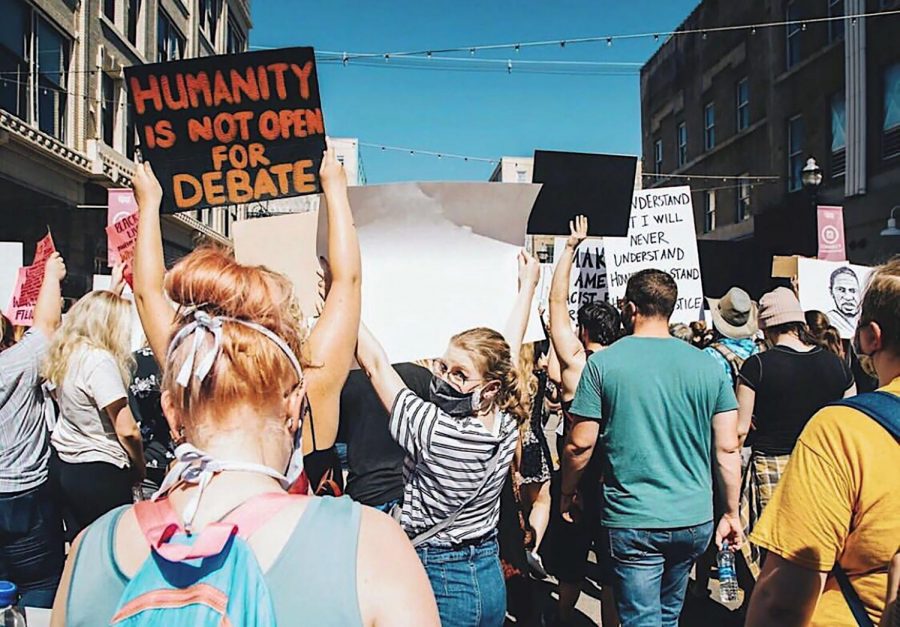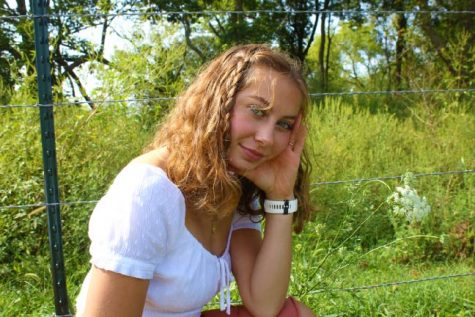Debating the Protests
When seeking change, some choose to protest; others disagree
Photo Provided By: Lauren Hulsebus
Students from Nixa High School attended Black Lives Matter protests around Missouri.
October 12, 2020
Protests and protesting about the protests have taken center stage this year. Celebrities and individuals have either been united by participating in protests or in their opposition to them.
The Black Lives Matter (BLM) movement has active since 2012, but gained the most awareness over the summer. George Floyd was killed by a police officer this year in May, sparking the movement further.
Senior Hannah Roesler was a part of a BLM protest in Springfield.
“It was really incredible to see such a large mixed group of people come together in support of one community in order to fight for change,” Roesler said. “We marched to the MLK bridge in downtown Springfield and observed an 8 minute moment of silence in remembrance of George Floyd and the other lives that have been lost.”
American Government teacher Clinton Longwell said protests have an effect on local and national governments.
“Local governments have had to relocate resources to deal with protests; other cities have made changes to their policing practices,” Longwell said. “On a national level, it has raised awareness of the Black Lives Matter movement and forced politicians to address it in the way they deem fit.”
The majority of these protests have occurred in larger cities across the country.
“Citizens who may have businesses or jobs in and around the areas where the protests are taking place are probably going to be affected,” Longwell said. “[Also], individual Americans who are not near or involved in Black Lives Matter protests have been re-engaged in the debate on how to best deal with racism in America.”
More NHS students, such as junior Amarra Fusco, have educated themselves on the issues.
“While I have not participated in any protests, I routinely donate what I can and try to educate myself. I also call my senators and representatives often,” Fusco said. “I think that these protests are absolutely necessary to bring attention to the strife of black Americans. There is so much prejudice facing people of color and many people are unaware of this inequality.”
However, there are students who have differing views on the protests, such as Junior Kaiden McCormick.
“I think you posting something — like when they did the black screen thing [on social media] — it brings more attention to something, but it doesn’t do any good,” McCormick said. “It’s not going to solve an issue. I understand people trying to bring attention to [it], but oftentimes they’re bringing attention to stuff they don’t know.”
Protestors hope to spark some sort of change, although there are no promises. Longwell says there is a more concrete way to bring about change:
“If citizens, businesses, politicians, activists would all come together and have meaningful discussions that lead to conclusions, that would be beneficial to the betterment of society,” Longwell said. “However, in such a hyper-partisan environment we live in, I think it will be difficult to have meaningful policy develop out of the Black Lives Matter protests.”
Historically, protests have taken place in America to call upon a resolution, and some of these have led to reforms. The First Amendment protects the right to peacefully protest.
“The basis of change in America has often come about because of protesting,” Roesler said. “For example, the Boston Tea Party, the Women’s Suffrage Parade, etc., have all contributed to policy change and overall change in the American people’s rights. I think protests are extremely important. Exercising your rights to protest and freedom of speech is crucial.”
Some believe that a portion of the protests could have been changed to better get their points across.
“Go through a more lawful route,” McCormick said. “I understand peaceful protests, but it would be better to find lawyers and speakers and preachers — people who have a voice in society — and use their ways to people without the violence and to get through the law system legally.”
However, some believe that the protests did what they needed to get the point across.
“I think these protests are very significant. They are bringing attention to the cause, and already individual states and cities have implemented police reform,” Fusco said.
McCormick said he believes that the violent protests could potentially hurt the U.S.
“The protests they’re doing have done more harm than good — they are hurling insults, burning businesses, and forcing opinion,” McCormick said. “If it gets to the point where you’re burning down things and everyone is taking advantage of the situation, I think it is hurting the country more.”
Fusco believes, however, that the harm is coming more from the country itself.
“About 1,000 civilians are killed each year by law-enforcement officers in the United States. According to a study by the Proceedings of the National Academy of Sciences, Black men are 2.5 times more likely than white men to be killed by police during their lifetime,” Fusco said. “It also states that about 1 in every 1,000 black men can expect to be killed by police.”
Education, and learning to seek unbiased news sources can help people on both sides of the issue.
“While I think protesting is important, I think the absolute best thing you can do is learn about the issues,” Fusco said. “I recommend using AP News, which is a non-biased news site that provides very down-the-middle facts. I also think we need to stop basing all of our opinions based on social media, as many lies are spread online.”
Using credible sources, such as The Washington Post, The Wall Street Journal and Politico can help reliably give information about political news and news in general.
“If you listen to the media, they point out every bad thing,” McCormick said. “But if you do your own research, you can find the good and the bad and decide for yourself.”






